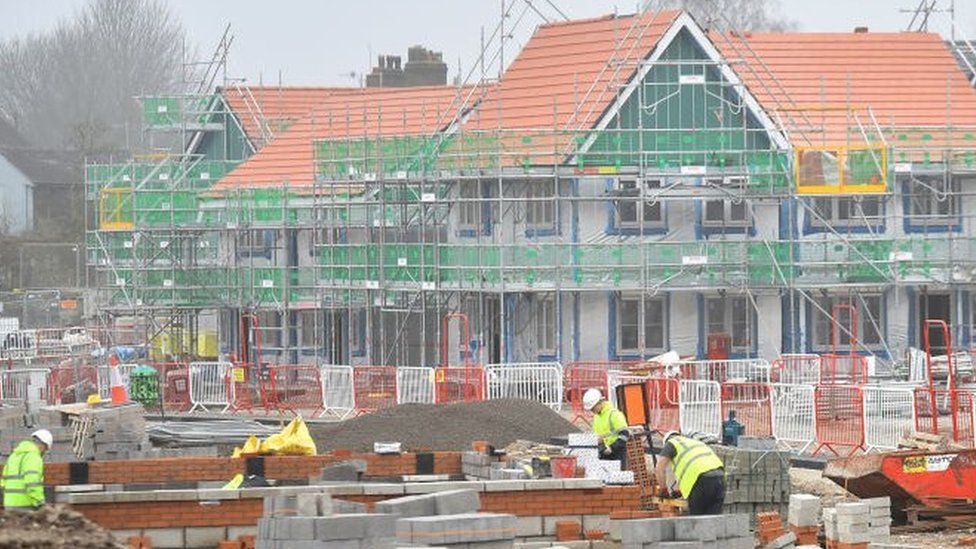The big problem of building waste and how to tackle it
- Published

If you have been involved in any sort of construction project recently, then you will be familiar with all the complaints about the soaring price of building materials.
A surge in demand for building, combined with supply constraints - blamed on the effects of the coronavirus pandemic - have sent prices for timber, cement and other essential supplies shooting higher.
But builders and their clients have little choice but to pay up if they want to get the job done.
"You have to make sure you've got enough, and you have to have a bit extra, in case something goes wrong or for whatever reason," says Joanna Spencer, manager of building firm R&J Construction Services.
One positive result is that the tighter supplies have made the industry reflect more carefully on how they use, and discard, their materials.
The construction industry produces a huge amount of waste - indeed, construction, demolition and excavation accounted for an astonishing 62% of the UK's total waste in 2018, according to the Department for Environment, Food and Rural Affairs.
Meanwhile, a study from 2013 suggested that 13% of materials delivered to a site go direct to waste without being used.
And a large portion of construction waste is not recyclable.
"When I speak to my members, they make a real effort to put waste in the right place, but products could be more eco-friendly," says Rico Wojtulewicz, head of housing and planning policy at the National Federation of Builders.
And, he adds: "If you look at how a local authority recycles, often they burn things rather than recycling, so the industry needs a more strategic approach to waste."
It was the waste problem that inspired Brittany Harris and Jade Cohen to create Qualis Flow, which sells a product designed to better manage building materials.
Currently, says Ms Harris, the construction industry only has incomplete, inconsistent data covering the materials that are on the building site, and how they are being used or wasted.
Generally, firms rely on paper delivery notes and the collation of email receipts. This paper trail is then manually entered into a project reporting tool, such as a spreadsheet.
"Firstly, this manual translation of data between systems results in around 60% of it going missing or being inputted wrong. So, the data we have in these reports is next to useless," she says.
"Secondly, the industry is made up of hundreds of huge contracting organisations and thousands of smaller companies working together to deliver these complex projects.
Each of these companies tracks and reports on their material consumption and waste generation in different ways, into different systems."
While QR codes or RFID tags can be used to help track materials, they're by no means universal, meaning that any firm relying on them would be limited in the suppliers they could use.
Qflow, by contrast, allows all materials to be clocked-in and out, simply by using a mobile app to capture an image of the docket, with a web portal used to view and export the data.
"It can be deployed in an instant anywhere you have a smartphone, and can support all types of construction, from small commercial re-fits up to major rail infrastructure projects."
Machine learning algorithms then allow the data to be structured to identify ways of eliminating waste and saving time, money and carbon on site.
Pressure is increasing for construction materials to be better managed, with Brexit and the Covid pandemic having caused many problems for suppliers.
"I think we're the only major sector that stayed open during lockdown, so all our work continued. What didn't continue was the material manufacturing worldwide," says Mr Wojtulewicz.
"All the materials are dropping and dropping in supply, so all of a sudden that created a huge dearth of materials."
Another company aiming to reduce construction waste is Enviromate, which operates a marketplace for building firms to buy and sell spare materials.
Co-founder Nigel Van Wassenhoven estimates that in its five years of trading, the company has diverted more than 200,000 tonnes of material from landfill, with bricks, timber and roofing materials the most traded products.
He says that, given rising prices, construction firms can no longer afford to let good materials go to waste.
Ms Harris, meanwhile, would like to see stronger regulation.
"A great example of how regulation can play a big role in shifting behaviours can be seen in Health and Safety. There are some great stats on reduction in deaths and accidents from a decade ago to now," she says.
A similar improvement could be made in waste she thinks, if a new regulatory body was set up that policed how companies reported and managed their carbon footprints.
Waste management is coming under the spotlight, with the Environment Agency warning earlier this year that it would take action against those failing to deal with waste responsibly.
Brian Berry, chief executive of the Federation of Master Builders, believes that the industry could do with more guidance.
"It is more difficult for small building firms to recycle, sort and store materials on smaller, and especially domestic, sites, so we must therefore provide extra support to builders to help them reduce, reuse and recycle," he says.
"A clear roadmap for how the construction industry can take steps to reduce the amount of waste it produces would be helpful for businesses who thrive on certainty and long-term policy."